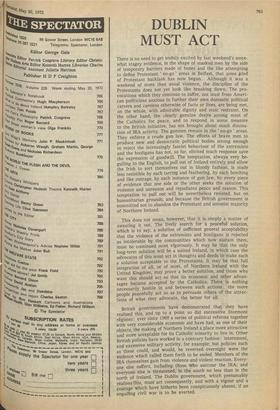DUBLIN MUST ACT
There is no need to get unduly excited by last weekend's somewhat stagey evidence, in the shape of masked men by the side of temporary barriers made of buses and the like attempting to define Protestant no-go' areas in Belfast, that some iKnd of Protestant backlash has now begun. Although it was a weekend of more than usual violence, the discipline of the Protestants does not yet look like breaking down. The provocations which they continue to suffer, not least from American politicians anxious to further their own domestic political careers and careless otherwise of facts or lives, are being met, on the whole, with admirable dignity and stoic restraint. On the other hand, the clearly genuine desire among most of the Catholics for peace, and to respond in some measure to the British initiative, has not brought about much diminution of IRA activity. The gunmen remain in the ' no-go ' areas. They enforce a crude gun law. The efforts of brave men to produce new and democratic political bodies strong enough to reject the increasingly fascist behaviour of the extremists and the hooligans has not, so far, elicited much response save the expression of goodwill. The temptation, always very beguiling to the English, to pull out of Ireland entirely and allow the Irish to sort themselves out in bloody fashion, is made less resistible by each tarring and feathering, by each bombing and like outrage, by each instance of gun law, by every piece of evidence that one side or the other seeks the solution of violence and unreason and repudiates peace and reason. This temptation to pull out will be nevertheless resisted, but on humanitarian grounds, and because the British government is committed not to abandon the Protestant and unionist majority of Northern Ireland.
This does not mean, however, that it is simply a matter of sweating it out. The lively search for a peaceful solution, which is to say, a solution. of sufficient general acceptability that the violence of the extremists and hooligans is rejected as intolerable by the communities which now sustain them, must be continued most vigorously. It may be that the only long-term solution will be a united Ireland, in which case the advocates of this must act in thoughts and deeds to make such a solution acceptable to the Protestants. It may be that full integration of all, or of most, of Northern Ireland with the United Kingdom, may prove a better solution, and those who want this should act so that its economic and other advantages become accepted by the Catholics. There is nothing necessarily hostile in and between such actions the more people peacefully act so as to persuade others of the attractions of what they advocate, the better for all.
British governments have demonstrated that they have realised this, and up to a point so did successive Stormont regimes : ever since 1968 a series of political reforms together with very considerable economic aid have had, as one of their objects, the making of Northern Ireland a place more attractive and more acceptable for its Catholic minority to live in. Other British policies have worked in a contrary fashion : internment, and excessive military activity, for example; but policies such as these could, and would, be reversed overnight were the violence which called them forth to be ended. Members of the IRA themselves gain from violence and violent reaction. Everyone else suffers, including those who succour the IRA; and everyone else is threatened, in the south no less than in the north of Ireland. The Dublin government, which presumably realises this, must act consequently, and with a vigour and a courage which have hitherto been conspicuously absent, if an engulfing civil war is to be averted.










































 Previous page
Previous page